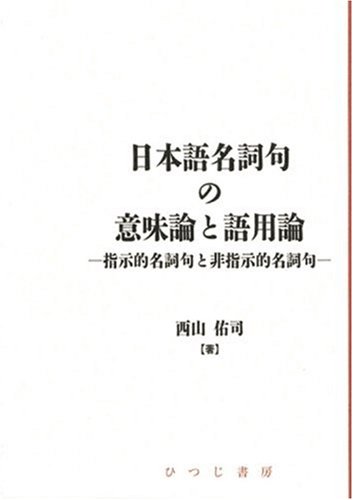3 0 0 0 OA 変形生成文法理論と哲学的意味論 内包主義の擁護
- 著者
- 西山 佑司
- 出版者
- 科学基礎論学会
- 雑誌
- 科学基礎論研究 (ISSN:00227668)
- 巻号頁・発行日
- vol.11, no.4, pp.133-140, 1974-03-15 (Released:2010-01-22)
- 参考文献数
- 61
- 著者
- 西山 佑司
- 出版者
- 明治書院
- 雑誌
- 日本語学 (ISSN:02880822)
- 巻号頁・発行日
- vol.35, no.5, pp.26-37, 2016-05
1 0 0 0 OA 「話し手が知っている文法」の意味
- 著者
- 西山 佑司
- 出版者
- 科学基礎論学会
- 雑誌
- 科学基礎論研究 (ISSN:00227668)
- 巻号頁・発行日
- vol.25, no.2, pp.69-75, 1998-03-31 (Released:2009-07-23)
- 参考文献数
- 24
1 0 0 0 OA 自然言語における文の長さについて 生成文法はどこまで可能か
- 著者
- 西山 佑司
- 出版者
- 科学基礎論学会
- 雑誌
- 科学基礎論研究 (ISSN:00227668)
- 巻号頁・発行日
- vol.22, no.1, pp.7-13, 1994-12-25 (Released:2009-07-23)
- 参考文献数
- 27
1 0 0 0 OA 書評
1 0 0 0 OA 表現の意味、真理条件、解釈の関係をめぐって
- 著者
- 西山 佑司
- 出版者
- 日本哲学会
- 雑誌
- 哲学 (ISSN:03873358)
- 巻号頁・発行日
- vol.2005, no.56, pp.113-129,6, 2005-04-01 (Released:2009-07-23)
- 参考文献数
- 20
The present paper considers the adequacy of an essential assumption in the philosophy of language in the twentieth century, which is that linguistic meaning is to be understood in referential/logical terms and that semantics is inherently truth conditional. Frege origi-nated this assumption. He defined Sinn (sense) as the determiner of Bedeutung (reference) . In contrast, linguistic semantics developed within the framework of the generative theory of grammar has no commitment to Frege's reference determining definition of sense. It defines sense as the determiner of sense properties and relations such as ambiguity, synonymy, analyticity, and entailment. Quine's argument that these sense properties and relations cannot be made objective sense of is critically reviewed.We claim that linguistic semantics is not truth conditional. Truth conditions are to be assigned to the proposition expressed by an utterance, which is captured by the theory of utterance interpretation, i.e., inferential pragmatics.Particular attention is paid to Yamada's argument that the content of illocutionary acts such as commands, promises, and the like cannot be identified with propositions. We claim that Yamada's argument is not convincing. We also comment on his idea of a general theory of content for illocutionary acts which generalizes Austin's theory of truth.
1 0 0 0 OA メンタルスペース理論におけるコピュラの分析はどこまで妥当か
- 著者
- 西山 佑司
- 出版者
- 日本認知科学会
- 雑誌
- 認知科学 (ISSN:13417924)
- 巻号頁・発行日
- vol.1, no.1, pp.1_135-1_140, 1994-05-20 (Released:2008-10-03)
- 参考文献数
- 11





